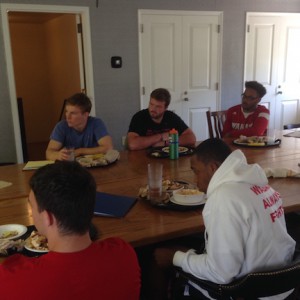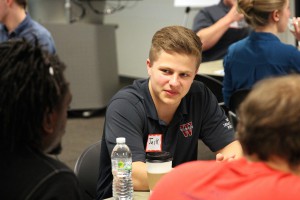by Anthony Douglas, ’17
A new school year brings a new office and new faces around the deliberation table for WDPD. In the office, are some returning Fellows, but in addition to this are 8 brand new Wabash Democracy Fellows, ready and energized for what looks like a hectic Fall semester for our program.

Wabash Democracy Fellows at our first meeting of the 2015-2016 year.
The Fellows convened on August 26th for our first day of training. The feel was slightly different considering the fact that the program went from 8 to 13 highly qualified Democracy Fellows. As we discussed and prepared for the events this semester will bring us, we also spent time sharing what brought us to the program or back for the returners.
Around the table, the Fellows discussed our deep passion for working through community problems, as well as the satisfaction of taking an issue and helping communities find solutions. With the energy and work ethic of the men around the table and under the direction of Dr. Sara Drury, we are very optimistic about what this year will bring for the program.
This Fall brings familiar challenges, but also some new opportunities for success. Our current plans–they are always evolving–we have a five on-campus events, and potentially three campus events. This year we’ve been requested to lead deliberations in a couple chemistry courses, a biology course, and a campus mental health dialogue. In addition to this, we are working with several community partners to facilitate a deliberation about childcare in the Montgomery County.
The Democracy Fellows will be nothing short of busy this semester, but we are always looking for opportunities in civic engagement and opportunities to serve communities. All in all, we look forward to what the future holds for the initiative and ready to get to work.

